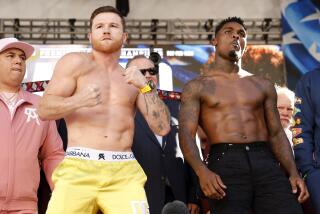THE GOLD STANDARD
- Share via
SYDNEY, Australia — Challengers come and challengers go, yet Cuban heavyweight Felix Savon endures. Michael Bennett of the United States learned that this week.
Bennett, who won the 1999 world title when Savon refused to fight him in protest of a decision that went against a Cuban boxer in a previous match, was thought to have a chance to defeat Savon in the quarterfinals. There were whispers that Savon might have become a little soft at 33, that he had been knocked out early this year in Cuba and had barely won the final at Cuba’s Olympic trials.
However, Savon proved he has lost neither the guile nor the passion to win on the Olympic stage. Bennett learned that at the receiving end of Savon’s punishing right hand, in a match the 6-foot-6 Savon won on the 15-point mercy rule, 23-8.
“Savon was the better warrior for the day,” Bennett said.
Savon, a product of a country that reveres boxers above all athletes, except baseball players, and lavishes boxers with personal and athletic privileges unavailable to others, has been the superior warrior for many days.
Savon, who has refused to turn pro because he claims professional fighters are exploited to make others rich, has dominated amateur boxing since he won his first world heavyweight championship in 1986. He has won six titles, among them a 1997 triumph gained when Ruslan Chagayev of Uzebkistan was disqualified for violating his amateur status.
Having won Olympic gold medals in 1992 and 1996, Savon is vying to match the record of his venerated compatriot, super-heavyweight Teofilo Stevenson, and win three golds in the same weight class. Lazlo Popp of Hungary is the only other three-time boxing gold medalist, having won at 165 pounds in 1948 and at 156 pounds in 1952 and 1956.
If politics hadn’t intervened, Savon might have already matched them: Cuba boycotted the 1984 Los Angeles Games and the 1988 Seoul Games, when Savon was the world champion and would have been the Olympic favorite.
Despite the boycotts, Cuba has won 23 gold medals since 1972. Its medal haul was four gold and three silvers at Atlanta in 1996, and Coach Alcides Sagarra predicted an even better showing in Sydney.
“We are going to clean up,” he said before the Games. “What we want is the national anthem [played] 12 times and our flag raised 12 times. All of our enemies are working to knock over the hegemony of the Cuban school of boxing. . . . We are not going to let them.”
But whereas Savon has maintained his dominance of the heavyweight class, his countrymen have fallen short. That has raised questions about whether the rest of the boxing world is catching up to the Caribbean nation.
Although 10 of 12 Cuban boxers reached the Olympic quarterfinals, four lost in that round. With all semifinalists guaranteed at least a bronze medal, Cuba will win no more than six medals; with light flyweight Maikro Romero losing in the semifinals, Cuba can win a maximum of five gold medals, including one by Savon when he fights Russia’s Sultanahmed Ibzagimov in Saturday’s final.
Russia has moved to the forefront in Sydney and is assured of having seven medalists, up from three at Atlanta in 1996. Ukraine will win five medals, and Kazakhstan and the U.S. each had four representatives in the semifinals. Of the 48 semifinalists, 22 were from the former Soviet Union.
U.S. boxers have also struggled, despite being promoted as perhaps the best team in years.
After winning six medals at Atlanta, the U.S. will take home four from Sydney: only bantamweight Clarence Vinson, featherweight Ricardo (Rocky) Juarez, light-welterweight Ricardo Williams and light-middleweight Jermain Taylor advanced past the quarterfinals, and Vinson lost his semifinal bout against Cuba’s Guillermo Rigondeaux on Thursday. Williams’ medal ends a streak of three consecutive Olympics in which U.S. boxers failed to win a medal in the 139-pound weight class.
“The team hasn’t lived up to my expectations,” said Gary Toney, president of USA Boxing.
Whether those expectations are realistic, given the emergence of new boxing powers, is another story.
More to Read
Go beyond the scoreboard
Get the latest on L.A.'s teams in the daily Sports Report newsletter.
You may occasionally receive promotional content from the Los Angeles Times.











